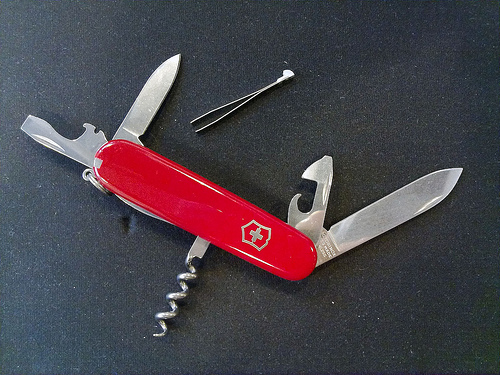
If you Google the words “How to become self-employed,” you’ll find a lot of advice about quitting your job, creating a plan for your own business, and of course, a few too good to be true pyramid schemes that promise a six figure income in just half a year. Most of these blog articles and MLM pitch pages fail to recognize, however, that not having an employer is only part of what it means to be self-employed.
In fact, all that you need to become self employed is to adopt the self-employed mindset. Adopting this mindset means making the realization that you are already self-employed, that you are, as Brian Tracy says, the “CEO of your own personal service corporation.” You may sell your services temporarily to an employer in return for a paycheck, but ultimately you have the power to decide who you sell your services to, and for how long. It doesn’t matter whether you’re a soldier in the business suit brigade, or a work-at-home T-shirt wearing renegade. You always have the choice to do what you want to do.
If you wish to adopt the self-employed mindset and you’re currently selling your services full-time to a company, it’s important that you yourself these questions:
1. What do I offer my employer?
- Do I help increase revenues, reduce costs, or ensure that operations run more smoothly?
- Can other people at my salary level offer more value than I do now?
2. What does my employer offer me?
- Is my ability to contribute limited by my need for a large company’s infrastructure? Do I need expensive lab equipment or access to my company’s intellectual property in order to contribute value?
- How much am I getting paid? Are other people who contribute the same level of value getting paid more or less than I am?
- Will the success I achieve in my current job help me toward achieving my long-term goals, or is it irrelevant?
- Do I have autonomy at work?
- Does my work help me grow?
- Does my work have meaning?
3. Does what I offer my employer match what my employer offers me?
Keeping the Balance
Remember: you’re the one who chooses your employer, not the other way around. You choose to gain the skills necessary to entice an employer to pay for your services. As a seller of your services, you must decide how long and for what reasons you’re selling yourself to your employer for. You must ensure that you’re getting what you deserve from your employer. You must also ensure you’re meeting your obligations and contributing value to your company. If these two are not in balance, and you are not aware of the imbalance, you risk getting fired or squandering opportunities that you never knew existed.
When your Contribution is Inadequate
It can be difficult to admit to yourself that you’re doing your job poorly, but the fact of the matter is there is some work that we just aren’t suited to do. After all, no one would buy computer software from Heinz and no one would buy ketchup from Microsoft.
We all have unique and natural talents, and oftentimes the work our employers choose for us turns out to be a poor application of those talents. Don’t be ashamed of your poor performance, but admit to yourself that you are indeed performing poorly. Once you make this admission, you’ll be much more open to the options available to you.
If your work is inadequate but you believe you have the potential to improve, then by all means do so. Take time out of working hours to study and improve your skills. Spend time thinking about ways you could do your work more efficiently rather than doubling your efforts in areas that have proven to yield poor results.
If study doesn’t help, you’re probably much better off doing something else. This doesn’t mean, however, that you have to change jobs. You could, for example, negotiate with your boss to change the scope of your responsibilities so that you’ll be doing something more in line with your natural talents. Negotiations like this are often most effective when you deflect attention away from your poor performance and sell your employer on your greater potential contribution doing some other kind of work.
If there is no way you can change the scope of your responsibilities or no way that you can gain enough skill in the right amount of time, you can always look for another job. It’s a good idea to explore opportunities at other companies the moment you realize you may not be able to make the best possible contribution in your current job. Changing your job is a big step, and should only be taken should all other avenues be exhausted (despite what headhunters may tell you). Sometimes, however, jumping ship is your best option.
Finally, if opportunities at other companies don’t seem like a good solution, it’s probably a good time to start thinking about either starting your own business or changing your career focus altogether. Both of these options entail significant risks, but risk is the price you pay for freedom. And if your contribution is inadequate, chances are you won’t be risking much.
When your Reward is Inadequate
When your employer doesn’t pay you enough for what you do, it’s important to take advantage of the situation as best you can.
First, it’s important to gauge your current market value: the salary that other employers will be willing to pay for your services. Headhunters will usually be happy to provide you with this kind of information. They’ll tell you whether other people doing your kind of work at your level of responsibility are making more money than you are. If that’s the case, they’ll do their best to arrange meetings with the other companies who are willing to offer more.
When you get down to it though, money is hardly the best possible reward for your services. You don’t have to look very far to find a significant amount of evidence that shows money doesn’t buy happiness. The general consensus seems to be is that once you’ve got the basic survival stuff like food, water, and shelter taken care of, money may elevate your happiness level a little, but not very much.
Considering this evidence, it makes sense that when it comes to work satisfaction, other factors should take precedence over money. Factors like:
- Autonomy – The freedom to do what you want, when you want. The ability to make decisions without having to defer to someone else.
- Growth – Doing work that helps you become a more effective person.
- Meaning – Doing work that has personal significance to you.
To me, these factors are much more important than money when it comes to making career decisions. If I had the choice to choose between any of these and more money, money would lose every time.
Even when you think you might deserve one, stop yourself before asking for a pay raise. Why not ask for an autonomy raise, a growth raise, or a meaning raise first? See if you can leverage your boss’ high opinion of you to negotiate a situation where you have more of these three things (and maybe a little more pay on top). If not, it’s probably best that you look for a new job or start your own business. Large corporations don’t tolerate being underpaid for the goods and services they sell. Why should you?
Bringing it into Focus
Having a self-employed mindset is vital to bring clarity to your career goals. When you see yourself as the CEO of a corporation of one, your perspective is no longer limited by the rules set down by your employer, or by anyone else for that matter. You’ll be able to realistically assess your career situation and know which actions you’ll need to take in order to increase both your earning power and your happiness. Becoming self-employed is something that you really can do today.




